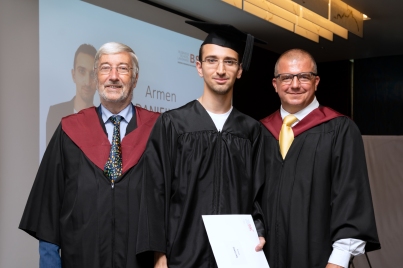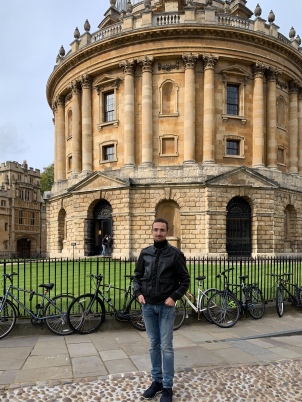
We are celebrating the success of BSL alumni member Armen Danielyan. Armen is a born leader with a wealth of knowledge and the world at his feet. He not only graduated from our accelerated BBA program but has since been accepted into a first-of-its-kind MSc program at Oxford University. We took some time to catch up with Armen to find out how he was able to get the most out of his time at BSL.
Tell us more about your time at BSL.
I enrolled in BSL’s accelerated BBA program in 2017. It was a unique study opportunity that made it possible for me to complete my Bachelor’s degree in only two years. The course was more intensive and required me to do five courses per term. During this period I was an active member of the student council and also worked as a tutor, organizing study sessions to help others prepare for subjects like accounting and statistics.
What do you think has been your most valuable lesson or experience as a BSL student?

There have been many valuable lessons during my two years at BSL, but I really value the ability to apply the theory I have learned to practical situations. I’ve always been interested in a broad variety of subjects and disciplines, and I was able to discover ways to apply what I learned at BSL to my interests, making my studies more relevant to my future.
What was one of your greatest achievements and how do you feel you were supported in achieving this?
One of my greatest achievements would definitely be my involvement in the Business Innovation Week. BSL traditionally organizes the event to bring BA and MS students together and facilitate communication. There was also an opportunity for students to compete against each other and showcase a summary of everything that they had learned at BSL, through making startup prototypes and financial plans.
However, BSL and our professors encouraged the Student Council to organize the Business Innovation Week under their supervision and guidance. We could contact and invite guest speakers and plan activities like peer-to-peer teaching modules. I was one of the students involved and hosted an Excel class. I think it was a success because students were able to teach one another skills that would complement our BSL studies and help us become more prepared for professional life.
Could you give us an example of how you’ve been able to apply the theory you have learned from your time at BSL to engage with your interests?
Being interested in many topics and skills has sometimes made it difficult to focus on one thing for too long. I realized that due to BSL’s small classes and more individualized approach, I would be able to often tailor study content and approach subjects in a way that allowed me to focus on my interests from several viewpoints, ensuring I didn’t have a one-dimensional, boring experience. This was different from previous university experiences where I couldn’t receive a flexible learning experience due to the high ratio of students to professors.
Could you tell us about your upcoming opportunity to study at Oxford?
I’ve been accepted to study a Masters in Energy Systems at Oxford University. I spent a long time looking for Masters programs where I could delve into this subject, but they were often limited to people with a background in science or engineering and made it difficult for people with my background to study further in this field. However, this program is Oxford’s first energy systems-related program that allows people with varied backgrounds to take part in this field.

Why did you choose Oxford specifically?
There were several factors that drew me to Oxford. This question was actually asked during the interview I had in the application process. While there are, of course, aspects like the university’s reputation and connections, I viewed Oxford differently than other ‘prestigious’ universities like Cambridge or Harvard, even before I applied. I think it happened naturally over the last couple of years, as I began to listen and read many individuals who taught there either before (such as C S Lewis and J R R Tolkien) or now (prof. John Lennox). So it just happened by chance that I became more engaged with Oxford over time, and how it became my goal to get there. But most importantly, it is the nature of their Masters degree program was what ultimately drew me in.
How is the Oxford degree structured and what are some of the subjects you’re excited to tackle?
Oxford’s MSc in Energy Systems is a brand new program, so I’ll be in its very first intake (probably also to be experimented upon as a guinea pig). The program will have a small intake of 10 full-time students from various backgrounds, and the idea is that we will teach each other our respective disciplines and how they relate to energy. There’s a significant aspect of peer-to-peer learning built into the structure of the program, and this was what separated it from other masters programs that I looked into. We will also be taught by professors from different departments on pretty much everything that relates to energy, from its science and various technologies to the markets and regulations. After three terms of studying, I will have to deliver a thesis by the end of summer, so the whole program is about a year long.
The idea is to prepare a specialist with broad (as opposed to narrowly specialized) understanding of energy, who would be able to integrate its various aspects and aid in making general decisions. I’m especially excited to see the new technologies that are currently being developed in a world-leading university and will be in the market in the next 10-20 years.
What values, expertise or lessons do you think you will take from your time at BSL that will help contribute to these programs?
During the application process, I was asked to prepare a presentation about the energy system implications for new legislation put forward by the Balearic Islands, aiming to have a 100% ‘clean’ energy supply by 2050.
I had to approach the topic by talking about the implications this decision will have on all aspects of society. My BSL experience enabled me to apply my knowledge of corporate social responsibility, public perception, and the supply chain to help make people think about how these areas will interact with energy.
My relationship with my professors also helped when it came to the physical applications, as BSL students can enjoy a close [professional] relationship with their professors. When it came to requesting letters of recommendation, it was easier to get strong and individualized commentary from people who knew my capabilities.
What are your personal values and vision for the future? Do you have a message for prospective BSL students?
I would like to keep my horizons broad in terms of my plans. I would like to stay in Europe and learn more about energy because it is a very relevant topic and I think there is a need to approach it from every aspect. In the long term, I would like to be more involved in energy solutions across Europe and eventually in Armenia.
My message to prospective and existing students is to make the most out of the freedom of a small business school where you can take the initiative to implement your own ideas and clubs. BSL continues to encourage students to create their own journey. So, take full advantage of every experience.
